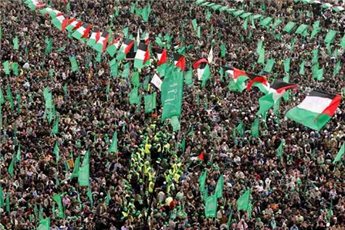
Last week, particularly on Saturday 8 December (a few days in advance, though , to make the day coincide with the day the first Palestinian Intifada broke out in 1987 in the Gaza Strip itself), the Gaza Strip witnessed several scenes of rapture, as thousands of people rallied in Gaza to celebrate the 25th anniversary of the funding the controversial organization Hamas (branded a terrorist group by various states, as well as by the EU). The celebrations (which had as a centerpiece a giant model of the missile fired at Tel Aviv during the recent conflict with the inscriptions “Made in Gaza” and “Palestine”) and the joy surrounding them added to the happiness and tranquility brought by the ceasefire between Hamas and Israel brokered by neighboring Egypt a fortnight ago. The crowd hailed above all an special guest: the religious movement’s leader since 1996, Khaled Meshal, who (after a long journey crossing the contentious border with Egypt, having been previously prevented from doing so by Mubarak) set foot on Palestinian territory for the first time in more than 45 years, his family forced to leave into exile after the 1967 Six-Day war.
While delivering his impassionate historic blunt speech, the Islamist figure was accompanied on the stage by Gaza’s PM Ismail Haniyeh (thus quieting down rumors about internal rivalries within the group) and other members of Hamas’ senior leadership in exile, particularly of the Political Bureau formerly based in Damascus, nowadays scattered throughout the Arab world. This has led to rumors about a key gathering of the group’s leaders, who may be eventually able to conclude its secretive elections.
Hamas thus managed to convey a message of unity and strength of the Strip, notably emboldened after the 8-day conflict with Israel. Palestinians nowadays feel victorious and vindicated, also thanks to the hallmark vote that took place in the UN General Assembly: Palestinians can now shout from their rooftops they have been recognized as inhabitants of a real (although UN non-member observer) state. Even though the vote was the result of Fatah’s Mahmoud Abbas’ bid, Hamas did not interfere with the procedure, and its supporters joined the celebrations that followed the announcement, which Mr Meshal called “a small step but a good one”.
Meshal’s speech was notoriously full of hatred, straightforwardly directed against Israel, a country he and his organization have pledged not to recognize: “as long as Palestine is ours and Palestine is the land of Arabism and Islam, we can never recognize the legitimacy is Israel’s occupation of it; Palestine is ours, not the Zionists”. Hamas also claims it is still committed to Israel’s “destruction”, Meshal shouting to this effect that the Jewish state would be wiped away through “resistance or military action”: “statehood will come from resistance, not negotiation”. He has however been hardly criticized when it comes to speaking about the borders Palestine should have as an independent country. Indeed, Meshal has issued conflicting statements, depending on the forum where these have been delivered. While he claimed last Saturday that “Palestine is ours from the river to the sea and from the south to the north; there will be no concession on an inch of the land”, he privately concedes in front of Western press (according to Le Monde) that a future Palestinian state can only be composed of Gaza and the West Bank (“We affirm our acceptance of a Palestinian state within the borders of 4 June 1967, with Jerusalem as its capital, without settlements”). Indeed, Khaled Meshaal embodies today a unique cocktail of contradictory elements, although this mix may be difficult to endure for many.
Meshal also addressed a key issue for Palestine: the eventuality of a Palestinian reconciliation. He did mentioned the prospect of a longtime awaited “national unity”, but a vital dilemma remains: what side is going to budge? Is Hamas really looking forward to engaging in transparent negotiations with Fatah or are they only aiming at presenting Meshal as a potential replacement for Abbas? Khaled Meshaal has obviously political ambitions that today go far beyond Hamas. In this sense, some pundits believe that when he announced he would not stand as the head of Hamas, the hypothesis was that he planned to become the new leader of the Palestine Liberation Organization in the context of an eventual Palestinian reconciliation.
A move heavy with symbolism, a move that heavily embarrassed Israel (particularly taking into account he survived an Israeli assassination attack in Jordan 1997). But… a move heavy with results?


